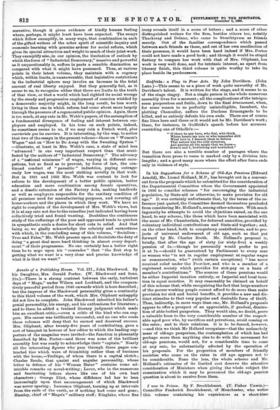Annals of a Publishing House. Vol. III., John Blackwood. By
his Daughter, Mrs. Gerald Porter. (W. Blackwood and Sons. 21s.)—There is a strong contrast between the early, turbulent days of " Maga," under Wilson and Lockhait, and the compara- tively peaceful period from 1840 onwards which is here described ; but the impress of the Blackwood personality gives a continuity to this third volume of the work, which Mrs. Oliphant unhappily did not live to complete. John Blackwood inherited his father's genial personality, his energy, and his enthusiasm for literature ; and to them he added a trained literary judgment which made him an excellent critic,—even a critic of the kind who can sug- gest. His career was brilliantly successful, and no one who reads these volumes will deny that he earned and deserved success. Mrs. Oliphant, after twenty-five years of contributing, gave a sort of banquet in honour of her editor to which the leading sup- porters of the magazine were invited—the function is pleasantly described by Mrs. Porter—and there was none of the brilliant assembly but was ready to acknowledge their " captain." Nearly all the interesting figures who pass through these pages con- tracted ties which were of friendship rather than of business with the house,—Trollope, of whom there is a capital sketch ; Charles Reade, that quaint and angular personality, whose letter in defence of his " Woman Hater" contains some ad- mirable remarks on novel-writing ; Lever, who in the numerous and fascinating letters shows like one of his own best characters ; George Eliot, whose diffidence led her to lean increasingly upon that encouragement of which Blackwood was never sparing ; Laurence Oliphant, turning up at intervals from the ends of the earth, as if nothing had come and gone ; Hamley, chief of " Maga's " military staff ; Kinglake, whose fine irony reveals itself in a score of letters ; and a score of other distinguished writers for the firm, besides others too, notably Thackeray and Delane, who came to Strathtyrum as friends merely. Out of the familiar correspondence which passed between such friends as these, and out of her own recollection of their presence, it would have been hard indeed if Mrs. Porter could not have made a good book ; and though it would be stupid flattery to compare her work with that of Mrs. Oliphant, her work is very well done, and for intrinsic interest, as apart from literary finish, this third volume is quite worthy to take its place beside its predecessors.






















































 Previous page
Previous page